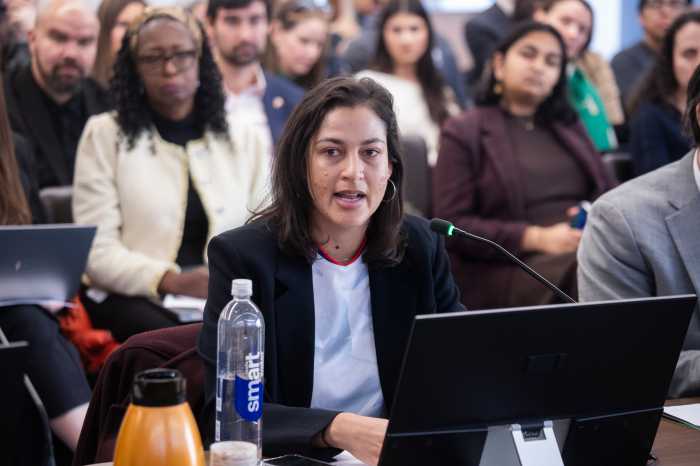By James DeWeese
After joining the force 20 years ago, when the 115th Precinct was in its infancy, Rolston walked a beat that brought him though many of the same Jackson Heights, East Elmhurst and North Corona areas for which he is now responsible.
“It's an area that I'm comfortable with,” Rolston said of the precinct, which is one of the city's most diverse.
Rolston, married for 17 years with two daughters, 11 and 14, grew up around 76th Street and Ditmars Avenue and attended local schools, including St. Francis of Assisi. His father was a projectionist at the now-defunct movie theater at 82nd Street and Northern Boulevard, he said.
Now in his second command position, Rolston said, his greatest asset is his experience.
“This is not my first command, so this is not a learning exercise for me,” said Rolston, 46. Before arriving at the 115th Precinct, Rolston spent 27 months as the commanding officer of the 108th, which covers Woodside, Sunnyside and Long Island City.
Over the course of his career, Rolston, who made captain in 2000, has been in both patrol and investigative positions, including internal affairs and the department's medical service, in Queens and in Brooklyn.
“My biggest accomplishment was being put in the position,” said Rolston, who added that he will miss the officers and friends he made at the 108th Precinct.
Leading any precinct is demanding, but the 115th Precinct is “just as challenging but on a larger scale,” he said.
In addition to fighting crime, Rolston is responsible for the well-being of his 240-officer staff as well as that of the civilians who work in the precinct.
“Nobody seems to think cops are humans,” Rolston said. “We do have personal lives. And we need to make sure (the officers) are taken care of.”
And then there are the vehicles and the building.
“You're pretty much running a company that has a $5 million budget,” Rolston said.
At the 115th Precinct, Rolston said he intends to build on the Police Department's 11-year record of progressive crime reduction.
The key, he said, is to work under the “broken window” theory, which holds that a broken window in an abandoned building will lead people to break them all if it is not repaired.
“The Police Department works … to take care of the small stuff before it becomes a major crime,” he said.
Enter the precinct's community council, whose meetings Rolston said seem a bit more spirited than others he has seen in the area. He likes it that way. “The meeting is a chance for the community itself to gain access to me,” he said.
During the April community council meeting, neighbors expressed concern about illegal car repair shops, buses that park overnight on certain streets potentially creating a shielded area for violent crime and fights between school children.
Rolston took the opportunity to tell neighbors that major crime in the precinct was down by 7 percent in the year-to-date figures. The one exception, he said, was burglary. “We have hardworking people here with nice things,” he said. But with the recent bust of an organized band of burglars, he expected those figures to drop, as well.
Outreach is also important, particularly in a precinct where so many foreign-born residents come from areas where police are seen as corrupt or the enemy, he said. “We do our best to make everybody feel comfortable with us.”
Rolston, who had two cousins on the force, said there was just something he found intrinsically attractive about police work.
“There's a lot of things that I've been exposed to that other people might not have seen,” Rolston said. Besides, he added, the department offers steady pay and good benefits.
“I think that everybody who comes on the Police Department has this idea that they want to help people.”
Reach reporter James DeWeese by e-mail at news@timesledger.com, or call 718-229-0300, Ext. 157.


































